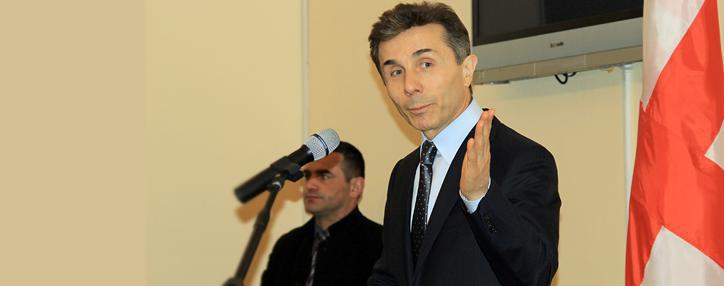Ivanishvili indignant as Rustavi-2 journalist questions about Karabakh
17.01.2013,
14:54
Georgian Prime Minister Bidzina Ivanishvili seemed indignant as Georgian Rustavi-2 TV channel journalist asked about his stance on Karabakh conflict statement made by Georgian FM Maia Panjikidze on January 10.

YEREVAN, January 17. /ARKA/. Georgian Prime Minister Bidzina Ivanishvili seemed indignant as Georgian Rustavi-2 TV channel journalist asked about his stance on Karabakh conflict statement made by Georgian FM Maia Panjikidze on January 10.
According to Azerbaijani media sources, being on a visit to Lithuania on January 10, Panjikidze allegedly stated “Karabakh conflict can be settled in favor of Azerbaijan’s territorial integrity only.” Meanwhile, the Armenian press claimed their Azerbaijani colleagues conveyed false information, and Panjikidze just stated she “respected the territorial integrity of Azerbaijan,” and she didn’t mention Nagorno-Karabakh at all.
On January 15 Georgia’s Ministry of Foreign Affairs posted a video of the minister’s speech on its Facebook page. From the video it is apparent Panjikidze supported the territorial integrity of Azerbaijan as a whole, but she never mentioned Nagorno-Karabakh.
“It is obvious the question is settled. Your TV channel has already said the matter was falsified, and you raise this issue again. You performed actively most, entertained us for two days, and later stated the matter is over,” harshly reacted Ivanishvili.
He noted he is pretty reluctant to expand over this issue and added he had already discussed this matter with Azerbaijan’s President Ilham Aliyev.
“Indeed, this is a complicated issue. Its settlement seems to be quite difficult in the near future. We support only peaceful settlement of this conflict. I wish the two sides could put much effort for peaceful settlement,” Ivanishvili said Thursday in Yerevan on a joint press conference with his Armenian counterpart Tigran Sargsyan.
Sargsyan, on his side, thanked his Georgian colleague for the balanced stance on the Karabakh conflict.
“It is not a secret that quite often these or those statements on Karabakh are misrepresented. We are thankful to our Georgian colleagues for appropriate reaction to put away the statements totally discrepant with Georgian government’s official position,” he said.
The conflict in Nagorno-Karabakh broke out in 1988 after the predominantly Armenian-populated Karabakh declared about secession from
Azerbaijan.
As Azerbaijan declared its independence from the Soviet Union and removed the powers held by the Karabakh’s government, the Armenian majority voted in 1991, December 10, to secede from Azerbaijan and in the process proclaimed the enclave the Republic of Nagorno-Karabakh. Full-scale fighting, initiated by Azerbaijan, erupted in the late winter of 1992. International mediation by several groups including Europe's OSCE’s failed to bring an end resolution that both sides could work with.
In the spring of 1993, Armenian forces captured regions outside the enclave itself. By the end of the war in 1994, the Armenians were in full control of most of the enclave and also held and currently control seven regions beyond the administrative borders of Nagorno-Karabakh. Almost 1 million people on both sides have been displaced as a result of the conflict. A Russian- -brokered ceasefire was signed in May 1994 and peace talks, mediated by the OSCE Minsk Group, have been held ever since by Armenia and Azerbaijan. -0-



